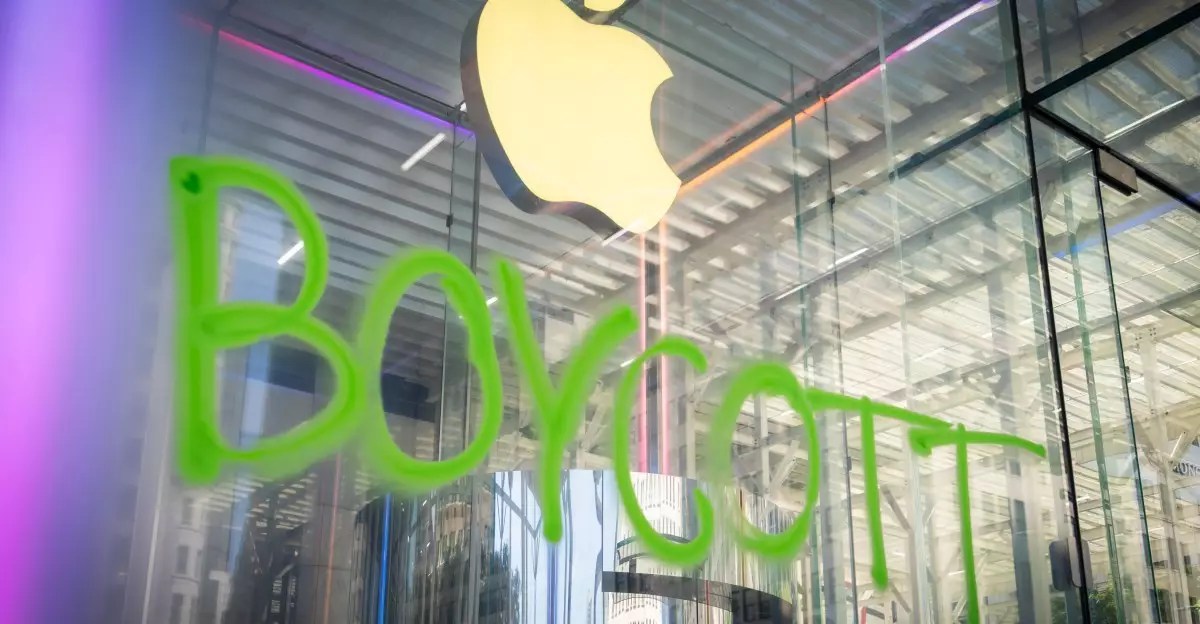In recent years, major technology companies have loudly proclaimed their dedication to combating climate change, often spotlighting lofty pledges, glossy sustainability reports, and public declarations of environmental stewardship. Yet, beneath these carefully curated images lies a troubling discrepancy between their words and actions. The recent protests targeting Apple and other tech giants serve as a stark reminder that corporate narratives often mask a reluctance—or even outright refusal—to confront the uncomfortable realities of their environmental impact.
These corporations leverage their immense influence to project a green image, often aligning themselves with initiatives like the Paris Agreement, which many critics argue they do merely as a way to preserve their reputations rather than effect real change. When scrutinized, it becomes clear that their commitments are often superficial, driven more by public relations needs than by genuine concern for the environment. The protest at Apple’s New York City store exemplifies this disconnect: while Apple claims to prioritize sustainability, its actions—such as supporting political figures who rollback environmental protections—serve as a betrayal of those very claims.
The Dangerous Gap Between Promises and Reality
One cannot ignore the troubling alliance between big tech executives and political figures who undermine climate progress. The protest highlighted the participation of figures like Tim Cook, Sundar Pichai, and Mark Zuckerberg at Donald Trump’s inauguration—a period marked by policies favoring fossil fuels and environmental deregulation. This contradiction is emblematic of how corporate interests often undermine the very climate commitments they publicly endorse, revealing a disconcerting pattern of hypocrisy.
Furthermore, the environmental impact of the tech sector itself is substantial and growing. Reports of escalating energy consumption by giants like Google and Microsoft paint a grim picture, especially when AI development—an area that promises innovation but consumes extraordinary amounts of power—continues to accelerate. This paradox—of a sector fighting climate change publicly while contributing significantly to its worsening—illustrates that virtue-signaling is often used as a cover for ongoing environmental exploitation.
The Corporate Silence and Public Apathy
In many cases, these companies avoid accountability under the guise of technological progress. Their investments in AI, data centers, and blockchain technologies are celebrated in boardrooms but shunned behind the scenes for their environmental toll. Meanwhile, protests like the one at Apple aim to challenge consumers and shareholders to scrutinize the authenticity of these claims. It’s clear that unless there is genuine pressure from the public and stakeholders, these companies will continue to prioritize profits and political alliances over sustainability.
The protest also controllers a broader narrative about corporate morality. Organizers accused Apple of colluding with a government led by a figure who actively dismantles environmental protections. This direct challenge confronts the fantasy that “green” companies are truly aligned with climate activism. It exposes their complicity and calls into question whether sustainability efforts are genuine or just strategic branding ploys designed to stave off regulation and maintain market dominance.
Awareness Versus Action: The Real Challenge
The core issue lies in transforming awareness into meaningful action. Public activism, such as spray-painting storefronts, is a visceral, disruptive tactic that draws attention to uncomfortable truths. It forces consumers and corporate leaders to confront the fact that corporate climate pledges are often hollow promises. Without accountability and enforceable commitments, these claims risk becoming mere marketing strategies rather than catalysts for tangible change.
Furthermore, the debate surrounding the tech industry’s role in climate change underscores a deeper societal failing: reliance on technological solutions alone cannot absolve corporate and political institutions of their moral dilemma. Climate progress requires systemic change, regulation, and a shift in priorities away from profit maximization and towards planetary health. The protests reflect the urgent need for society to challenge corporate narratives and demand sincerity in their efforts to address climate crises.
In the end, what these protests reveal is not just corporate hypocrisy but a broader societal complacency. Until genuine commitments translate into policy changes, sustainable practices, and transparent accountability, the climate fight remains an illusion—a story of promises made but hardly ever kept.


Leave a Reply